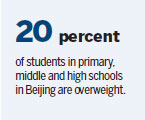Beijing to make a citywide push for student nutrition
Boarding schools in Beijing will be banned from selling soda drinks in cafeterias and stores inside campuses this year, part of an effort to encourage students to eat healthy food, the city's health authority said.
The Beijing Municipal Commission of Health and Family Planning said on Wednesday that it will launch a campaign to establish "health cafeterias" in all schools to improve students' nutritional balance.
"Problems such as obesity have haunted parents and children, and the solution starts with controlling what they eat," said Du Hong, deputy head of disease control at the commission.

Pilot healthy cafeterias have been established in 59 schools. The program will be rolled out to all schools within this year.
Under a city regulation, boarding schools must "strictly control food high in fat, salt and sugar, including burgers and instant noodles, and must ban unhealthy beverages such as soda".
Schools should offer food safety and nutrition education classes each semester, as well as provide students' health information to parents on a regular basis, the regulation said.
Each school cafeteria should have one full-time or part-time nutritionist to make suggestions for the menu. And a weekly menu should be posted in notable places, along with nutritional information.
Also under the regulation, alternative menus will be recommended to students with various health conditions.
According to a survey of all Beijing schools by the city health commission, students eat too much meat and salt, and lack sufficient healthy food, including vegetables, fruit and milk. About 20 percent of students in primary, middle and high schools in Beijing are overweight.
Among the obese children, about 30 percent have high blood sugar and fat.
This year, the city's health department will revise health guidance for students, and will conduct another nutrition and health survey of students in Beijing's seven districts.
The survey is expected to find out the main reasons for nutritional imbalance among students by assessing their knowledge, attitudes and assumptions about food, as well as noting their nutritional intake and other factors.
A strategy is expected to be devised based on the survey's findings.



















